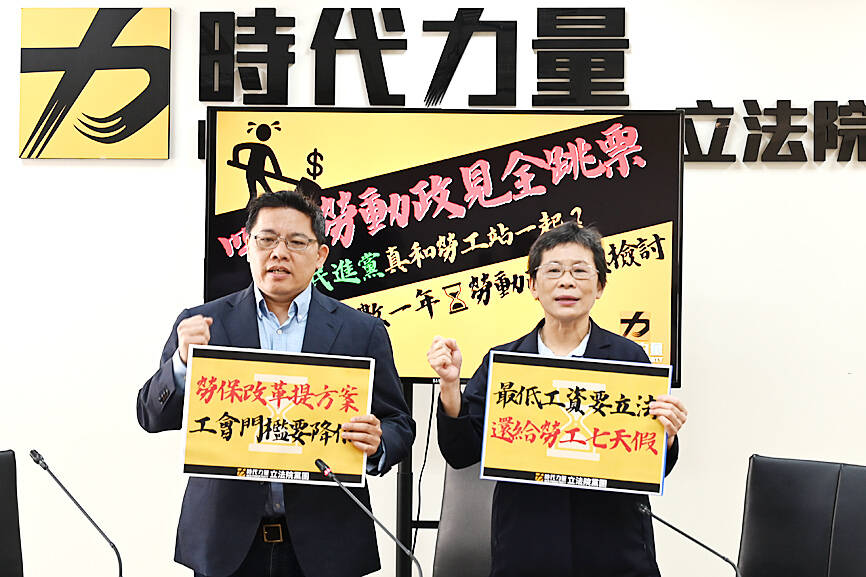The Democratic Progressive Party (DPP) has failed to deliver on its labor policy-related promises, the New Power Party (NPP) caucus said on Friday, urging the government to act swiftly to put its plans into practice.
The caucus was referring to President Tsai Ing-wen’s (蔡英文) promises to launch a labor pension reform, lower union formation thresholds, draft a minimum wage act and a national holiday act, define the minimum living standard for workers, and restore seven national holidays that people might have to work without compensatory leave or extra pay after an amendment to the Labor Standards Act (勞動基準法) was passed in 2016.
The amendment guarantees that people have compensation days for work on weekends, but did not set rules for work on national holidays. The arrangement sparked protests from workers and labor groups.

Photo: Wang Yi-sung, Taipei Times
NPP caucus whip Chiu Hsien-chih (邱顯智) said that despite Tsai and Minister of Labor Hsu Ming-chun (許銘春) calling labor reform urgent, the administration has not taken any meaningful steps to that end in Tsai’s seven years in office.
The Labor Insurance Fund is at risk of becoming insolvent and no amount of subsidies would be enough to address the issue, Chiu said.
Even DPP lawmakers have said that the government owes tens of millions of Taiwanese a reform of the fund, he added.
Chiu said that Tsai pledged to increase the union coverage rate among workers, but the membership rate remains low at about 8 percent.
This is because the Labor Union Act (工會法) sets excessive standards that prevent employees at 97 percent of all companies from forming unions, he added.
The NPP has received complaints about the Ministry of Labor stonewalling workers’ attempts to establish a national union, Chiu said.
The ministry is hostile toward workers, even though it claims to be the workers’ greatest friend, he added.
NPP Legislator Chen Jiau-hua (陳椒華) focused her criticism on Vice President William Lai (賴清德), saying that despite his claim that the “DPP has always stood shoulder to shoulder with workers,” the Cabinet failed to draft a minimum wage act when Lai served as premier from 2017 to 2019.
Instead, the Cabinet drafted an amendment to the Labor Standards Act that made the situation worse, increasing total work hours and reducing the time between shifts, while refusing to reinstate rules that would guarantee workers compensation days or extra pay for work on national holidays.

Taiwan is stepping up plans to create self-sufficient supply chains for combat drones and increase foreign orders from the US to counter China’s numerical superiority, a defense official said on Saturday. Commenting on condition of anonymity, the official said the nation’s armed forces are in agreement with US Admiral Samuel Paparo’s assessment that Taiwan’s military must be prepared to turn the nation’s waters into a “hellscape” for the Chinese People’s Liberation Army (PLA). Paparo, the commander of the US Indo-Pacific Command, reiterated the concept during a Congressional hearing in Washington on Wednesday. He first coined the term in a security conference last

Prosecutors today declined to say who was questioned regarding alleged forgery on petitions to recall Democratic Progressive Party (DPP) legislators, after Chinese-language media earlier reported that members of the Chinese Nationalist Party (KMT) Youth League were brought in for questioning. The Ministry of Justice Investigation Bureau confirmed that two people had been questioned, but did not disclose any further information about the ongoing investigation. KMT Youth League members Lee Hsiao-liang (李孝亮) and Liu Szu-yin (劉思吟) — who are leading the effort to recall DPP caucus chief executive Rosalia Wu (吳思瑤) and Legislator Wu Pei-yi (吳沛憶) — both posted on Facebook saying: “I

The Ministry of Economic Affairs has fined Taobao NT$1.2 million (US$36,912) for advertisements that exceed its approved business scope, requiring the Chinese e-commerce platform to make corrections in the first half of this year or its license may be revoked. Lawmakers have called for stricter enforcement of Chinese e-commerce platforms and measures to prevent China from laundering its goods through Taiwan in response to US President Donald Trump’s heavy tariffs on China. The Legislative Yuan’s Finance Committee met today to discuss policies to prevent China from dumping goods in Taiwan, inviting government agencies to report. Democratic Progressive Party Legislator Kuo Kuo-wen (郭國文) said

The Ministry of Economic Affairs has fined Taobao NT$1.2 million (US$36,900) for advertisements that exceeded its approved business scope and ordered the Chinese e-commerce platform to make corrections in the first half of this year or its license would be revoked. Lawmakers have called for stricter supervision of Chinese e-commerce platforms and more stringent measures to prevent China from laundering its goods through Taiwan as US President Donald Trump’s administration cracks down on origin laundering. The legislature’s Finance Committee yesterday met to discuss policies to prevent China from dumping goods in Taiwan, inviting government agencies to report on the matter. Democratic Progressive Party